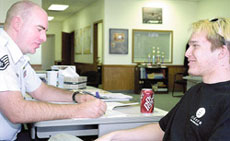War has little effect on enlistment

Air Force Sgt. Scott Self goes over paperwork with Jonathan Hardison, Joplin, who decided to join the Air Force and specialize in computers.
Times of trials and crises on a national and global scale may often cause people to wonder about the impacts on military enlistment and recruiting.
However, the days of signing up today and shipping out tomorrow have long since passed.
Cmdr. Steven Lowry, public affairs officer for Navy Recruiting Command, said there is no measurable way to indicate whether the outbreak of war in Iraq has had any effect on Navy enlistment.
Lowry said while there is no observable trend, anecdotal information from recruiters indicates some individuals are saying to themselves, “This is a war, I’m thinking twice about enlisting.”
“An equal number are saying, ‘Something important is being done, I want to be a part of that,'” Lowry said.
Lowry said the person who signs up today will not see his/her first duty station for months and months. He said the recruit would first go home for two to four months and wait to be assigned an entrance date for boot camp.
Lowry said boot camp lasts for two months, and subsequent training schools last from two to 18 months.
Staff Sgt. Michael Hammond, spokesman for U.S. Air Force 349th Recruiting Squadron, said it is too soon to tell if enlistment is changing due to war.
He said several recruiters have reported slightly higher “office traffic”(people showing interest in enlistment) but that things have been business as usual for the Air Force. He said most enlistees entering the Air Force now first visited a recruiting office between four and 12 months ago.
Lowry said military recruiting efforts are based upon maintaining congressionally mandated troop strength. He said Congress sets a troop number for each military branch, and the law requires that the forces be maintained within 1 percent above and 1/2 percent below that required strength.
Lowry said the recruiting mission is carefully planned to account for the expected loss of personnel. The plan must also allow for adjustment to actual losses as well.
Lowry said the last few years have revealed a new trend.
“More people are staying,” he said. “Retention is up, and it’s gone through the roof unexpectedly.”
Hammond said recruiting for the Air Force has been getting better for more than two years. He was quick to point out the fact the trend predates the attacks of September 2001.
“It doesn’t take a war to get people to sign up with the Air Force,” Hammond said. “Last year was the best in 16 years.”
As retention goes up, recruiting goals go down. As a result, Lowry said, pre-qualification standards for Navy enlistees have gone up. He said law requires that 90 percent of enlistees hold high school diplomas, but the Navy required 92 percent in 2002 and 94 percent in 2003.
Lowry said required scores on the Armed Services Vocational Aptitude Battery have also been raised.
“The Navy has set artificial levels to get a higher quality recruit,” Lowry said.
Hammond is unabashed about his enthusiasm for the Air Force.
“Our greatest goal is to keep the people we have,” Hammond said. “The benefits of being in the Air Force speak for themselves.”
Your donation will support the student journalists of Missouri Southern State University. Your contribution will allow us to purchase equipment and cover our annual website hosting costs.



























